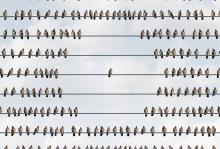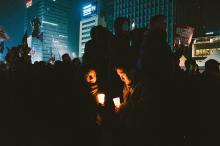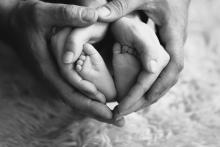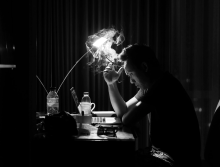Opinion

We feel a deep darkness in our world and in our society right now. We can almost taste it, touch it, and smell it. This darkness invades our souls like a damp, long, December night, bringing a chill all the way inside.

I ask myself how we got here, why the American church has hardened its hearts to refugees when one of the major themes of the Bible is welcoming the stranger. How did we lose trust in a vetting system that has worked for decades? How did we begin to see refugees as dangerous when there is no statistical evidence to back it up? How did we forget that so many of us are descendants of people who were oppressed and looking for a better life? How did we stop seeing the beauty of American culture as coming from a collision of cultures? How did we lose our way — did it happen overnight or has it been slowly brewing for a long time?

Jesus actively participated in the lives of everyone whom he met by offering them love, acceptance, and healing. He particularly sought out and served those whom religious folk deemed to be great sinners.

While casting our troubles onto God is a critical aspect of our faith, I fear that we often interpret burden as one-directional, particularly with how we react to social injustice. These days, it is hard to miss the consistent threat to human rights on multiple levels, but it is still possible to avoid responding to them. Particularly during the past year, I have heard so many colleagues verbalize their decisions to avoid watching or reading the news because it’s too distressing. Furthermore, common responses from Christian colleagues to my (admitted) rants about the world’s concerning state include “It’s not of God to worry,” and “All of this is a part of God’s master plan.” The feedback that strikes and disturbs me most is when I hear that we should ultimately go to God to comfort our distress over the world’s injustice, often insinuating self-soothing over action.
5. Sick of 'It’s a Wonderful Life'? Try These Other Christmas Films
“…That’s one of the things we look for in a Christmas movie. No, not a leg lamp: a world still innocent enough for such things to cause a scandal. It’s refreshing. Reassuring. And, these days, as elusive as reindeer on one’s roof.”
6. 262 Journalists Imprisoned in 2017
According to the Committee to Protect Journalists, the number of journalists imprisoned for their work reached a record high, with Turkey topping the list for the second consecutive year.

Let’s accept Trump’s challenge to “bring back Christmas” — let’s live into God’s love that unites the poor, welcomes the stranger, and frees the oppressed. Let us repent, and kneel before the manger to embrace a poor and refugee Christ. Let us get up and work for a world that will not condemn and crucify him.

Tuesday night was a surprise — a joyful surprise to many of us who have grown accustomed to seeing our country’s immorality find new depths. White racial bigotry lost Tuesday in Alabama. Misogyny, the abuse and mistreatment of women, lost Tuesday in Alabama. And let’s be clear: It was black voter turnout — and black women, in particular, who voted against Judge Roy Moore by 98 percent — that made the difference.

We cannot leave the fate of our world and our future generations exclusively to the political leaders of our time. As Christian citizens of every nation, we have a responsibility to bear witness to the things that make for peace.

In this sense, Star Wars: The Last Jedi is an Advent movie. Director Rian Johnson’s wildly fun and thoughtful entry into the Star Wars canon finds its heroes at a precarious turning point. The film makes its characters grapple with the flaws of their established order, consider whether any of it is worth saving, and move forward by embracing the hopeful qualities of the Force and the Resistance.

Despite arguments regarding the meaning of the so-called “separation of church and state,” the U.S. Constitution does not prohibit the expression of religious belief. As many Christian conservatives correctly point out, the phrase “separation of church and state” does not even occur in the Constitution.

When we can name even the source of our hopes and fears as some kind of grace, we can actually experience God’s grace.

The idea that government has an important role to play in human flourishing was made by Pope Leo XIII in his 1891 encyclical Rerum Novarum. In it, the pope argued that governments should promote “the common good.” Catholicism defines the “common good” as the “conditions which allow people, either as groups or as individuals, to reach their fulfillment more fully and more easily.”

As we face the 21st century realities of ISIS-backed terrorism and reactionary Christian nationalism, we are grappling with the nature of evil, as Merton and others did in the late 1930s. Given the similarity of our contexts, Merton’s insight is prescient. "There was something else in my own mind,” Merton wrote as he watched World War II coming, “the recognition, 'I myself am responsible for this. My sins have done this. Hitler is not the only one who has started this war: I have my share in it too.'"

God of wholeness,
come and fill our hearts and minds,
and our bodies
with deep abiding love.
1. The Problem With “Silence Breakers” as TIME’s Person of the Year
I decided to search for two words on the article’s web page: “patriarchy” or “misogyny.” Zero results.
2. WATCH: Tracee Ellis Ross’ Children’s Book for Handsy Men
“It’s kinda like a children’s book … for men ... that is going to make this really simple.” Actress Tracee Ellis Ross reads her funny-but-oh-so-direct new book, The Handsy Man, on Jimmy Kimmel.

But Jesus said, if you would be perfect, go, and stop pretending racism doesn’t exist, stop supporting political leaders who lie and manipulate, stop being co-opted by political agendas, and stop slandering people who are different from you.

President Trump and the Republican National Committee, on the other hand, are supporting an accused child molester for the U.S. Senate. It is as if the Catholic bishops were promoting a child abuser for bishop.

The Darkest Hour raises uncomfortable questions about the nature of war and what justifies military action. We see the sacrifice of 4,000 British soldiers at Calais in order to rescue the 300,000 British Expeditionary Forces at Dunkirk. It is an agonizing moment, a devastating sacrifice. In May of 1940, none of those leaders and soldiers had any idea that those casualties were not a complete waste of human life, that were it not for Britain’s refusal to surrender and agree to terms with Hitler that world events could have taken an even darker turn.

These are the times in which we now live. The turbulence of this year has left many of us feeling buffeted by constant storms in politics, society, and nature. Amid this daily chaos, fear, and pain, one thing is clear: The role of faith leaders across society is more important than ever. Our call and our ministry requires us to stay radically rooted.

Peacemaking isn’t a passive withdrawal from conflict — it’s an intentional movement toward it with tools to understand, heal, and transform. It’s time for Christians across the U.S. to engage in this conflict in a helpful, curious way. I know there is a lot of confusion and complexity around this and, for the sake of my friends (Jews, Christians, and Muslims) in the region, as well as our collective wellbeing, I feel compelled to offer a few brief observations on today’s announcement by President Donald Trump on the U.S. embassy and the status of Jerusalem as the capitol.